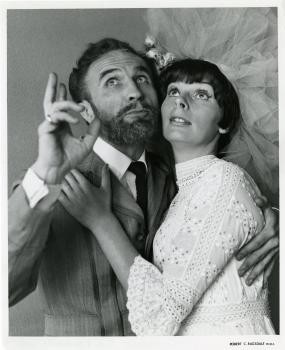
Herbert Morse, who later changed his name to become known professionally as Barry Morse, was born on June 10, 1918, in the East End of London, England. Although he had dropped out of school, the 15-year-old auditioned for and obtained a scholarship to attend the Royal Academy of Dramatic Art (RADA). One of his audition pieces was an excerpt from George Bernard Shaw's Saint Joan. Shaw was, in fact, a benefactor of RADA and occasionally dropped by to visit the students and teach. Morse thrived under Shaw's periodic tutelage and immersed himself in all of Shaw's works. Indeed, over the course of his career, Morse performed in all of Shaw's plays and directed many of them. Upon his graduation from RADA, Morse distinguished himself in radio, winning the BBC's Radio Award which led to several prominent roles in radio drama. He also began making a name for himself in live theatre, notably in several West End productions, including Crisis in Heaven directed by John Gielgud in 1944.
Morse performed in many repertory theatres, and it was at one in January of 1939 in Peterborough that he met actress Dorothy Anna "Sydney" Sturgess. They were married in March of that year and had two children Melanie Virginia Sydney Morse MacQuarrie (born 1945) and Hayward Morse (born 1947). The family came to Canada in 1951 and settled in Montreal, where both parents continued their performing arts careers. Almost immediately on coming to Canada, Morse worked in live radio with appearances on CBC television soon after. Around 1953 (when Morse obtained his Canadian citizenship), the family relocated to Toronto where he became involved with Crest Theatre, which in its early days ran a series of fund-raising performances in aid of the newly established Actors' Fund of Canada (AFC). Perhaps not coincidentally, it was at this time that he along with four other actors (Jane Mallett, Barbara Hamilton, Donald Davis, and William Needles) each contributed a symbolic $1 to establish the AFC, an organization "designed to help anyone, anywhere, who has ever been engaged in any branch of the entertainment industry," according to the AFC's history.
Perhaps Morse's most recognizable role was that of Police Lieutenant Philip Gerard in the American TV series The Fugitive. The show ran for four seasons (120 episodes total) and was nominated for 5 Emmy Awards. It won in the category of Outsanding Dramatic Series in its final season (1966).
Morse's enthusiasm for Shaw led him to the Shaw Festival as both actor and its second artistic director. During his brief tenure in 1966 at the struggling new festival, he brought it to international attention and sold-out performances.In 1976, he was a founding member alongside Gordon Pinsent, Kate Reid, Amelia Hall, George Luscombe and others of Theatre Compact, an independent theatre in Toronto with an adventurous repertoire. Over the two years of its existence the company mounted plays by August Strindberg, Anton Chekhov, John Murrell, Alan Richardson, and Michael Brodribb.
Over Morse's seven-decade acting and directing career in radio, TV, film, and on stage, he performed more than 3,000 roles. Morse, predeceased by his wife, died in England on February 2, 2008.
Among his papers are personal diaries kept by him (and in at least one case jointly with his wife), scripts, house programs, correspondence, photographs, audio-visual materials.
Dates
Types of Materials
- Audiovisual Material
- Photographs
- Posters
- Published Material
- Unpublished Material and Manuscripts
Extent
Approx. 7.5 m of textual and other materials.
How to Access This Resource
Appointments are required to view this material and can be made through Archival & Special Collections.
Call number XZ1 MS B053. Contact our reference staff for a detailed inventory.
- Ask Chat is a collaborative service
- Ask Us Online Chat hours
- Contact Us